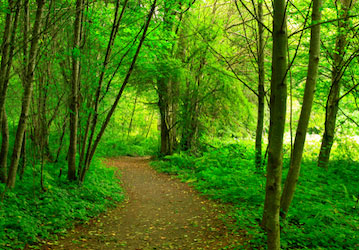Have you ever been really stressed or frustrated and decided to take a walk outside to cool down? Or maybe you were struggling with a tough decision and went outside to take time to reflect. It turns out, science has your back on these strategies. There are many benefits to immersing yourself in nature or “nature bathing,” (known in Japan as shinrin-yoku or forest bathing). Nature bathing can help decrease stress—and the impacts of stress on your body such as lowering your heart rate and blood pressure. Mindfully spending time in nature has been shown to fight symptoms of depression, lower anxiety, and boost your immune system and overall well-being. Nature bathing can increase creativity and problem solving too.
Practice mindfulness in nature
You’re not alone if you’re skeptical. The last time you did a ruck march or training outside it might not have felt like it relieved a ton of stress. Practicing mindfulness can be the key to getting the full benefits of being outside. Mindfulness is the act of noticing your current state and surroundings, such as when you do the following:
- Use all 5 senses to fully savor the nature around you.
- Take time to really look at and appreciate the blue of the sky or water, the green on the trees, the white of the clouds.
- Listen to the rustling of the leaves, the movements of water, the sounds of animals or insects.
- Feel the wind breezing through your hair or the sun warming your skin.
- Taste the crispness of the air, and smell the freshness of being outside.
The benefits of mindfulness in nature include much of the Total Force Fitness spectrum including physical, mental, social, and spiritual health.
Total Force Fitness guide to being in nature
Nature is what’s known as a “restorative environment,” an environment that can help you reduce and recover from mental fatigue and build your mental fitness. Restorative environments have 4 elements: fascination, a sense of being away, a sense of being part of a larger whole, and a place you find satisfying on its own. Try these Total Force Fitness strategies to get the holistic benefits of being outside.
- Physical Fitness: When you can, trade the treadmill or elliptical for running outside. See if your post or local community has any outdoor fitness stations to move your muscle-building workout outside too.
- Nutritional Fitness: Rather than having lunch at your computer or while watching TV, take it outside! Add local fruits and vegetables to your diet to further connect with nature using your sense of taste. Use HPRC’s mindful eating guide to help.
- Social Fitness: Why have that meal alone when you can ask someone to join you? Start the habit of going on a family walk after dinner. Or if your family is going to a local store or restaurant, ride your bikes. Try having a walking meeting outside. Encourage your kids to get outside too.
- Spiritual Fitness: Connecting with nature is a core principle of spiritual fitness. Taking time outside to meditate, pray, or reflect is great way to connect with nature, the universe, or a higher being. Use HPRC’s strategies to build your spiritual fitness reflection as a daily outdoor spiritual practice.
 Need tips to balance technology & telework? Find Out More
Need tips to balance technology & telework? Find Out More
Bottom line
The next time someone says “let’s take this outside,” consider saying, “thank you!” Take the opportunity to further de-stress, build resilience, and improve your overall health. Learn more about how you can get the full benefits of nature at HPRC’s blog on the mindful green road walk.





